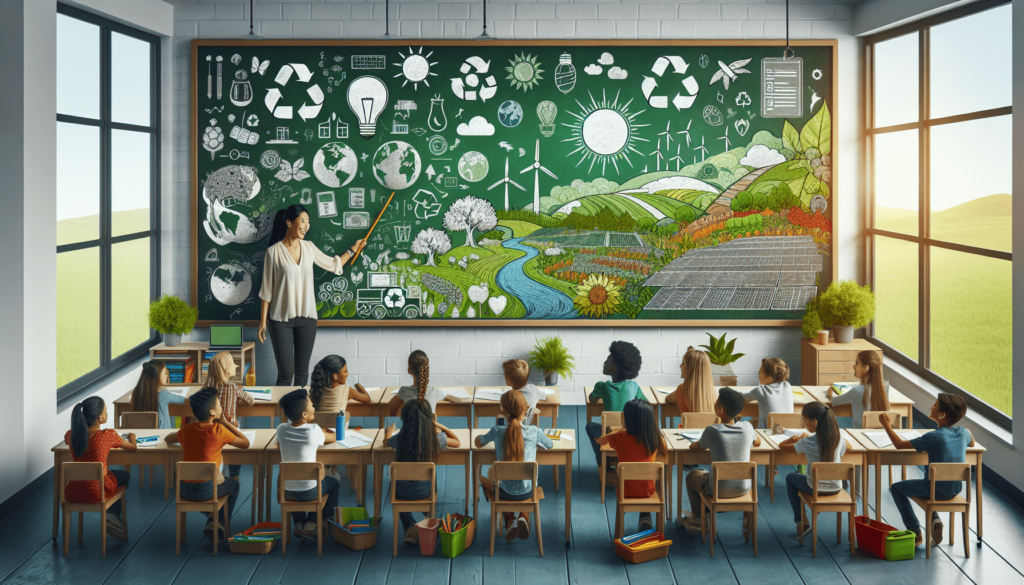In today’s rapidly changing world, the importance of sustainability has become increasingly crucial. As we face global issues such as climate change and resource depletion, it becomes clear that we must take action to ensure the well-being of future generations. Education plays a crucial role in promoting sustainability as it equips individuals with the knowledge, skills, and mindset needed to make informed choices and take environmentally-responsible actions. By integrating sustainability into curriculums and teaching practices, we can empower individuals of all ages to become active contributors towards a more sustainable future.
1. Creating awareness about sustainability
1.1 Educating students about the concept of sustainability
One of the fundamental aspects of promoting sustainability is educating students about the concept itself. By introducing sustainability as a core topic in the curriculum, students can develop a comprehensive understanding of its meaning and implications. Teachers can engage students in interactive discussions and activities to explore the various dimensions of sustainability, including environmental, social, and economic aspects. By imparting this knowledge, students can develop a solid foundation and become conscious global citizens who recognize the importance of sustainable practices in their everyday lives.
1.2 Teaching the importance of sustainable practices
Educating students about the importance of sustainable practices is crucial in fostering a mindset that values responsible actions. Through lessons and practical experiences, teachers can highlight the link between individual choices and their impact on the environment and society. By illustrating real-life examples and case studies, students can grasp the consequences of unsustainable practices and recognize the potential for positive change. This approach helps students understand that their actions have the power to create a sustainable future and encourages them to make informed choices in their daily lives.
1.3 Raising awareness about environmental issues and their impact on sustainability
In order to promote sustainable practices, it is essential to raise awareness about the pressing environmental issues of our time. With a focus on topics such as climate change, deforestation, and pollution, students can comprehend the urgency and severity of these challenges. Teachers can organize discussions, workshops, and field trips to provide students with first-hand experiences and insights into the environmental issues affecting their communities. By understanding the interconnectedness of these issues and their impact on sustainability, students can develop a sense of responsibility and become motivated to take action.
2. Developing critical thinking skills
2.1 Encouraging students to analyze complex sustainability challenges
To effectively address sustainability challenges, it is crucial to develop critical thinking skills in students. By encouraging them to analyze complex sustainability challenges, teachers can foster a mindset that values thoughtful evaluation and creative problem-solving. Through inquiry-based learning approaches, students can explore multifaceted issues and consider diverse perspectives. This approach helps students develop the ability to think critically, evaluate evidence, and propose innovative solutions.
2.2 Promoting problem-solving and decision-making abilities
Sustainable development requires individuals who can effectively solve problems and make informed decisions. By integrating problem-solving and decision-making activities into the curriculum, teachers can enhance students’ abilities to tackle sustainability challenges. Students can be engaged in hands-on projects that involve identifying sustainable solutions, assessing potential impacts, and making informed choices. These experiences cultivate problem-solving skills, enable students to navigate complex scenarios, and empower them to become active agents of change.
2.3 Fostering a culture of innovation and creativity
Innovation and creativity are essential drivers of sustainable development. Education plays a vital role in nurturing these skills by providing opportunities for students to explore innovative ideas and approaches. By incorporating project-based learning and design thinking methods, teachers can inspire students to develop creative solutions for sustainability challenges. These activities encourage students to think outside the box, collaborate with peers, and approach problems with an innovative mindset. By fostering a culture of innovation and creativity, education empowers students to become drivers of sustainable change.

3. Encouraging sustainable behavior
3.1 Instilling values of responsible consumption and production
A key aspect of sustainability is responsible consumption and production. Education can play a pivotal role in instilling values that promote sustainable behavior in students. By teaching about the environmental and social impacts of consumption, teachers can raise awareness about the importance of making conscious choices. Students can be encouraged to adopt practices such as reducing waste, reusing materials, and choosing sustainable products. By integrating these values into their daily lives, students can contribute to a more sustainable future.
3.2 Teaching sustainable waste management practices
Waste management is a critical aspect of sustainable development. By educating students about sustainable waste management practices, teachers can equip them with the knowledge and skills necessary to minimize environmental impacts. Students can learn about recycling, composting, and waste reduction strategies. Hands-on activities, such as organizing waste segregation initiatives or designing recycling programs, allow students to put their knowledge into practice. By cultivating responsible waste management habits, students can actively contribute to a more sustainable and circular economy.
3.3 Promoting eco-friendly transportation options
Transportation plays a significant role in contributing to carbon emissions and environmental degradation. Education can play a vital role in promoting eco-friendly transportation options among students. By raising awareness about the environmental impacts of different modes of transportation, teachers can encourage students to choose sustainable alternatives such as walking, cycling, or using public transportation. Schools can also organize initiatives such as carpooling or promoting electric vehicles to reduce carbon footprints. By promoting eco-friendly transportation options, students can actively participate in mitigating the environmental impacts of transportation.
4. Integrating sustainability across the curriculum
4.1 Incorporating sustainability topics in various subjects
Integrating sustainability topics across various subjects allows students to understand the interdisciplinary nature of sustainability challenges. By incorporating sustainability concepts in subjects like science, social studies, and geography, teachers can provide students with a comprehensive understanding of the interconnectedness of environmental, social, and economic systems. For example, in science classes, students can learn about renewable energy sources and their benefits. In social studies, they can explore the social implications of sustainable development. By integrating sustainability topics across the curriculum, education can foster a holistic understanding of sustainability.
4.2 Providing interdisciplinary learning opportunities
To further enhance students’ understanding of sustainability, interdisciplinary learning opportunities can be provided. By encouraging collaboration between different subjects and promoting project-based learning, students can explore complex sustainability challenges from multiple perspectives. For example, students can work together on projects that involve designing sustainable transportation solutions, considering urban planning elements, and analyzing the economic viability of their proposals. Integrating different subjects in such projects helps students realize the interdependencies between disciplines and broadens their perspective on sustainable development.
4.3 Applying real-world examples of sustainability in education
To make sustainability education more meaningful and relatable, teachers can incorporate real-world examples into their lessons. By exploring local and global sustainability initiatives, students can see how sustainable practices are being implemented in different contexts. Teachers can invite guest speakers from local sustainability organizations or arrange field trips to environmentally friendly businesses. By connecting theory with practice, students can gain insights into the practical applications of sustainability and be inspired to take action in their own lives.

5. Empowering students to take action
5.1 Engaging students in sustainability projects and initiatives
Empowering students to take action is a crucial aspect of sustainability education. By involving students in sustainability projects and initiatives, teachers can provide them with practical opportunities to apply their knowledge and skills. Students can work on projects such as designing and implementing recycling programs, organizing awareness campaigns, or conducting research on sustainable practices. These projects enable students to develop leadership skills, enhance their problem-solving abilities, and foster a sense of ownership and responsibility towards sustainability.
5.2 Encouraging youth participation in environmental activism
Environmental activism plays a crucial role in driving sustainable change. Education can inspire and encourage students to actively participate in environmental activism. Teachers can organize discussions or invite environmental activists to share their experiences and insights. By teaching students about peaceful activism, the power of grassroots movements, and the importance of civic engagement, education can foster a commitment to sustainable action among students. By empowering students to voice their concerns and take collective action, education can fuel a new generation of environmental activists.
5.3 Supporting students in implementing sustainable solutions in their communities
Education should go beyond raising awareness and empower students to become change-makers in their communities. Teachers can support students in implementing sustainable solutions by providing resources, mentorship, and guidance. Students can be encouraged to identify sustainability challenges in their communities, develop action plans, and collaborate with local stakeholders to implement their solutions. By supporting students in their initiatives, education can instill a sense of agency and responsibility in students, enabling them to make a tangible difference in their communities.
6. Developing skills for sustainable careers
6.1 Offering educational pathways for sustainability-focused professions
Promoting sustainability education goes hand in hand with preparing students for sustainable careers. Education institutions can offer educational pathways that specifically focus on sustainability-driven professions. This can include degree programs in fields like environmental science, sustainable development, renewable energy, or green technology. By providing specialized education in these areas, institutions can equip students with the knowledge and skills necessary to pursue fulfilling careers that contribute to global sustainability goals.
6.2 Providing practical training and internships in sustainable industries
In addition to academic education, offering practical training and internships in sustainable industries is essential for preparing students for sustainable careers. Partnering with local businesses and organizations, educational institutions can provide students with hands-on experiences in sectors such as renewable energy, eco-tourism, sustainable agriculture, or waste management. These opportunities enable students to apply their theoretical knowledge, gain industry-specific skills, and understand the challenges and opportunities in sustainable industries. By providing practical training, education bridges the gap between theory and practice, preparing students for successful sustainable careers.
6.3 Equipping students with entrepreneurial skills for sustainable business ventures
Entrepreneurship plays a critical role in driving sustainable innovation and economic growth. Education can equip students with entrepreneurial skills necessary for sustainable business ventures. By integrating entrepreneurship education into the curriculum, students can learn about sustainable business models, social entrepreneurship, and impact investing. Students can also participate in business plan competitions or develop sustainability-focused projects as part of their coursework. By fostering entrepreneurial skills, education empowers students to create sustainable solutions, start their own businesses, and contribute to economic development while addressing environmental and social challenges.
7. Promoting sustainability in educational institutions
7.1 Implementing sustainable practices in school operations
Educational institutions have a responsibility to lead by example in promoting sustainability. This can be achieved by implementing sustainable practices within the school’s operations. Schools can adopt energy-efficient technologies, reduce water consumption, and implement waste management systems. Additionally, promoting sustainable procurement and reducing the use of single-use plastics can contribute to a more sustainable environment within the school. By practicing what they teach, educational institutions showcase the importance of sustainability and inspire students, staff, and the wider community.
7.2 Setting up green infrastructure and facilities
Creating a sustainable learning environment goes beyond sustainable practices. Educational institutions can set up green infrastructure and facilities to further promote sustainability. This can include installing solar panels, establishing rainwater harvesting systems, or creating green spaces for students to engage with nature. By providing access to sustainable infrastructure and facilities, educational institutions enhance the learning experience and foster a deeper connection with sustainability among students.
7.3 Involving the entire school community in sustainability efforts
Promoting sustainability requires collective action. Educational institutions can involve the entire school community, including students, teachers, staff, and parents, in sustainability efforts. This can be achieved through establishing sustainability committees or student-led organizations that actively work on sustainability initiatives. By engaging the school community, educational institutions foster a sense of shared responsibility and create a supportive environment for sustainable practices. Involving parents and families in sustainability dialogues and events strengthens the impact of education by extending sustainability lessons beyond the school walls.
8. Collaborating with external stakeholders
8.1 Partnering with local businesses and organizations for sustainable initiatives
Collaboration with external stakeholders is essential for promoting sustainability initiatives in education. Educational institutions can partner with local businesses and organizations that share the commitment to sustainability. These partnerships can provide students with access to expertise, mentorship opportunities, and real-world experiences. Collaborating with sustainability-focused stakeholders can also help educational institutions create environmentally friendly campuses and implement innovative sustainability projects.
8.2 Engaging parents and families in promoting sustainability
Parents and families play a crucial role in supporting sustainability education. Educational institutions can engage parents and families in promoting sustainability through various initiatives. This can include organizing workshops on sustainable practices for parents, inviting guest speakers to share sustainable living tips, or involving parents in sustainability projects and committees. By strengthening the partnership between schools and families, education can create a unified approach to sustainability that extends beyond the walls of the classroom.
8.3 Forming partnerships with government agencies and NGOs
Partnerships with government agencies and non-governmental organizations (NGOs) are vital for scaling up sustainability efforts in education. Educational institutions can collaborate with these entities to access resources, expertise, and funding opportunities. Government agencies can provide support through policy recommendations, funding grants, or curriculum development initiatives. NGOs can offer educational materials, workshops, or volunteer opportunities to instill sustainability values in students. By forming partnerships with these external stakeholders, educational institutions can amplify their impact and drive systemic change.
9. Addressing global sustainability challenges
9.1 Including global perspectives on sustainability in education
Sustainability is a global concern that requires a global perspective. Education can address global sustainability challenges by incorporating diverse perspectives into the curriculum. By exploring sustainability issues from different regions and cultures, students can develop a broader understanding of the complex nature of global sustainability challenges. Teachers can include case studies from around the world, incorporate global environmental agreements and initiatives, and encourage intercultural dialogues. By embracing global perspectives, education prepares students to become global citizens who understand and engage with global sustainability challenges.
9.2 Encouraging international cooperation and knowledge exchange
International cooperation and knowledge exchange are crucial for addressing global sustainability challenges. Education can play a significant role in fostering collaboration between students, teachers, and educational institutions worldwide. By promoting initiatives such as student exchanges, joint research projects, or virtual classrooms, education can facilitate the sharing of best practices, innovative ideas, and diverse perspectives. By encouraging international cooperation and knowledge exchange, education strengthens the global network of sustainability advocates and accelerates progress towards global sustainability goals.
9.3 Advocating for policies and actions to address global sustainability issues
Education has the power to influence policymakers and advocate for policies and actions that address global sustainability issues. Educational institutions, teachers, and students can actively engage in advocacy efforts by raising awareness and promoting sustainability-focused initiatives. This can include organizing conferences, participating in public consultations, or collaborating with NGOs and government agencies. By leveraging their knowledge and collective voice, education advocates for policies and actions that prioritize sustainability and drive positive change at the global level.
10. Monitoring and evaluating progress
10.1 Establishing metrics to assess sustainability education outcomes
Monitoring and evaluating the impact of sustainability education is essential to ensure continuous improvement. Educational institutions can establish metrics to assess sustainability education outcomes. These can include measures such as knowledge gained, behavior change, or the integration of sustainability practices in the curriculum. Regular assessments and surveys can gauge students’ attitudes towards sustainability, their understanding of key concepts, and their participation in sustainability initiatives. By establishing metrics, educational institutions can track progress, identify areas for improvement, and celebrate successes in promoting sustainability.
10.2 Regularly reviewing and updating sustainability education strategies
As sustainability challenges evolve, it is crucial to regularly review and update sustainability education strategies. Educational institutions can conduct periodic assessments of their sustainability education efforts to identify gaps and emerging trends. This can be done through surveys, evaluations, or consultations with the school community, including students, teachers, and parents. By reviewing and updating sustainability education strategies, educational institutions can respond effectively to changing needs and ensure the relevance and effectiveness of their sustainability education programs.
10.3 Sharing best practices and lessons learned in promoting sustainability
Sharing best practices and lessons learned is vital in promoting sustainability in education. Educational institutions can establish platforms for sharing experiences, initiatives, and resources related to sustainability education. This can include organizing conferences, webinars, or creating online platforms where educators can exchange ideas and learn from one another. By sharing best practices, educational institutions create a network of sustainability educators who can inspire and support each other in promoting sustainability. The sharing of knowledge and experiences strengthens the overall impact of education in driving sustainable change.
In conclusion, education plays a central role in promoting sustainability by creating awareness, developing critical thinking skills, encouraging sustainable behavior, integrating sustainability across the curriculum, empowering students, developing skills for sustainable careers, promoting sustainability within educational institutions, collaborating with external stakeholders, addressing global sustainability challenges, and monitoring progress. By implementing these comprehensive strategies, education can foster a generation of environmentally conscious and socially responsible individuals who will lead the way towards a sustainable and resilient future.

